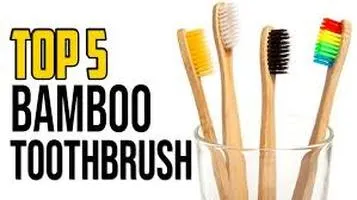Bamboo Toothbrushes: A Detailed Review
Bamboo toothbrushes are an eco-friendly alternative to conventional plastic toothbrushes, designed to reduce environmental impact. The handle of a bamboo toothbrush is made from sustainably sourced bamboo, a fast-growing, renewable resource known for its natural antibacterial properties. This makes bamboo toothbrushes both biodegradable and compostable, significantly minimizing plastic waste in landfills and oceans. The bristles, typically made from BPA-free nylon or biodegradable materials, effectively clean teeth while being gentle on gums. Available in various styles and colors, bamboo toothbrushes cater to different oral care needs. By choosing bamboo toothbrushes, consumers contribute to a more sustainable lifestyle, promoting environmental conservation while maintaining effective oral hygiene. Their minimalist design and natural look also add an aesthetic appeal to any bathroom setting.

As the world becomes increasingly conscious of environmental issues, products that offer sustainable alternatives to everyday items are gaining popularity. Among these eco-friendly innovations, bamboo toothbrushes have emerged as a popular choice for those looking to reduce their plastic waste. In this review, we will delve into various aspects of bamboo toothbrushes, including their design, performance, environmental impact, and value for money.
Design and Aesthetics
One of the first things that catch your eye about bamboo toothbrushes is their aesthetic appeal. The natural wood grain of bamboo offers a rustic and organic look that stands in stark contrast to the bright, often garish colors of plastic toothbrushes. Bamboo toothbrushes typically come with soft to medium bristles, which are often made from biodegradable materials like nylon-4 or castor oil derivatives. The handle is ergonomically designed, providing a comfortable grip, and often features an anti-slip coating or textured surface for better handling.
Performance
When it comes to performance, bamboo toothbrushes generally hold their own against traditional plastic varieties. The bristles are effective at removing plaque and debris without being too harsh on the gums. Most bamboo toothbrushes come with soft or medium bristles, catering to a wide range of dental needs. However, it is important to note that the bristles may not be as durable as those found on high-end plastic toothbrushes, which might necessitate more frequent replacements.
It is also worth mentioning that bamboo toothbrushes tend to dry faster than plastic ones, reducing the risk of bacterial growth. However, it is advisable to store them in a dry place and avoid leaving them in a damp environment to prolong their lifespan.
Environmental Impact
The primary selling point of bamboo toothbrushes is their minimal environmental footprint. Traditional plastic toothbrushes contribute significantly to global plastic pollution, with billions ending up in landfills and oceans every year. Bamboo, on the other hand, is a highly sustainable material. It grows rapidly, requires minimal water, and does not need pesticides or fertilizers. Moreover, bamboo is biodegradable, meaning that the handle of a bamboo toothbrush will decompose naturally over time.
Another environmental benefit is the reduced carbon footprint associated with bamboo cultivation and manufacturing processes. Bamboo absorbs more carbon dioxide and releases more oxygen compared to other plants, making it an excellent resource for combating climate change.
However, it is crucial to be mindful of the bristles' composition. While some manufacturers use biodegradable materials, others might still use nylon bristles that need to be removed before composting the handle. Additionally, packaging is another factor to consider. Opt for brands that use recyclable or compostable packaging to ensure a fully eco-friendly purchase.
Value for Money
Bamboo toothbrushes are generally more expensive than their plastic counterparts, but the price difference is often justified by their environmental benefits and aesthetic appeal. Prices can vary significantly depending on the brand and the specific features offered, such as charcoal-infused bristles or ergonomic handles. While the upfront cost may be higher, many consumers find the investment worthwhile for the peace of mind that comes with making a sustainable choice.
Additionally, some brands offer subscription services or bulk purchase options, which can bring down the overall cost. Given the increasing demand for eco-friendly products, it is likely that prices will become more competitive over time.
Pros and Cons
Pros:
1. Eco-Friendly: Bamboo toothbrushes significantly reduce plastic waste and are biodegradable.
2. Aesthetic Appeal: The natural look of bamboo is visually pleasing.
3. Performance: Effective at cleaning teeth and gums.
4. Sustainability: Bamboo is a rapidly renewable resource with low environmental impact.
Cons:
1. Cost: Generally more expensive than plastic toothbrushes.
2. Durability: Bristles may wear out faster, requiring more frequent replacements.
3. Bristle Composition: Not all brands use biodegradable bristles, which may require removal before composting the handle.
4. Storage: Requires careful storage to prevent mold and prolong lifespan.
Conclusion
Bamboo toothbrushes offer a compelling alternative for environmentally conscious consumers. They combine functionality and aesthetics with a significantly reduced environmental footprint. While they may come at a higher cost and require some additional care in terms of storage, the benefits far outweigh these minor inconveniences.
As with any product, it is essential to do your research and choose a reputable brand that aligns with your values. By making the switch to bamboo toothbrushes, you are taking a small but meaningful step towards a more sustainable future.






